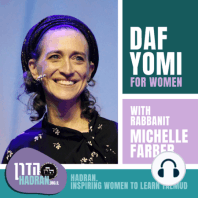39 min listen
Yevamot 39 - April 15, 14 Nissan
ratings:
Length:
49 minutes
Released:
Apr 15, 2022
Format:
Podcast episode
Description
Why didn’t Abaye question Raba from the ketuba in our Mishna where the woman’s family has a non-definitive claim to her money while the yabam has a definitive claim (as the property is in his possession) and yet they split the proceeds according to Beit Shamai? To answer that question, they reread the Mishna and claim that Beit Shamai wasn’t relating to that case. Abaye brings a third explanation of the two parts of the Mishna by distinguishing between when the property came to the woman. The first part is referring to property given to her when she was waiting for yibum, therefore the yabam has no claim to the property. The second was referring to property that was given to her when she was married to the first husband, which would then go by default to the yabam upon the husband’s death. According to Abaye, the debate between Beit Shamai and Beit Hillel regards whether or not the husband's hand is considered like the wife's hand in her possession or is it stronger than the wife's hand. The yabam's hand will always be weaker than the original husband - if so, he will either have as much power as the woman or less. Rava beings a fourth explanation of the Mishna - the first part is when the yabam did not yet do maamar and in the second part he did do maamar. Those who agree/disagree with Rava each have different understandings of Beit Shamai's position regarding maamar - did Beit Shamai just say it was strong enough to exempt her relative (i.e. if her sister fell to yibum to the yabam that she did maamar with). Or is it strong enough to give him rights to her property? Rav Papa thinks that the Mishna fits best with Abaye's reading, except for the fact that the second part is about the woman dying when it could have easily brought the case of her still alive and regarding the produce. The Mishna stated that she is his wife for all intents and purposes - for what purposes? Why is this necessary to have been mentioned? Ideally the oldest brother should do yibum. But if he does not, the court asks each of the brothers. In the event that no one wants to do it, the court goes back to the oldest brother and requires him to do it. One does not wait for a brother who is not available at present to do yibum if there are others to do it. There are two versions of a dispute between Rabbi Yochanan and Rabbi Yehoshua ben Levi. The first version is if there is a younger brother who will do yibum or an older brother who will do chalitza, which is preferable. In the second version, all agree that a younger brother who will do yibum is preferable, but the debate is regarding chalitza - is there a preference for the older brother or is he and a younger brother equal if they are only doing chalitza? Our Mishna is brought according to each version to try to prove on or the other opinion but all attempts are unsuccessful. A Mishan is Bechorot 13a states that originally yibum was preferable, but now chalitza is preferable as people are not doing yibum with the intention of the mitzva. Rav stills holds, though, that the choice is up to the brother and we do not force him to do chalitza. Rami bar Hama holds that the law changed yet again and yibum is ideal. Why? The Gemara explains his position that they originally held like Abba Shaul that one cannot perform yibum unless one only intends to perform the mitzva, but not because he finds her beautiful or just wishes to marry her. But then they held like the rabbis who permitted yibum in any case. A braita is brought that is explained in two different ways - one way to match Abba Shaul and the other to match the rabbis.
Released:
Apr 15, 2022
Format:
Podcast episode
Titles in the series (100)
Berakhot 8: It is best to pray at the time that the community is praying. Why is that? What type of things is it important to pray for? Is it better to pray in a synogogue or a place where one learns? Why? Is it best to live near one's rabbi or not? One should... by Daf Yomi for Women - Hadran
